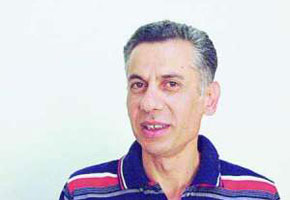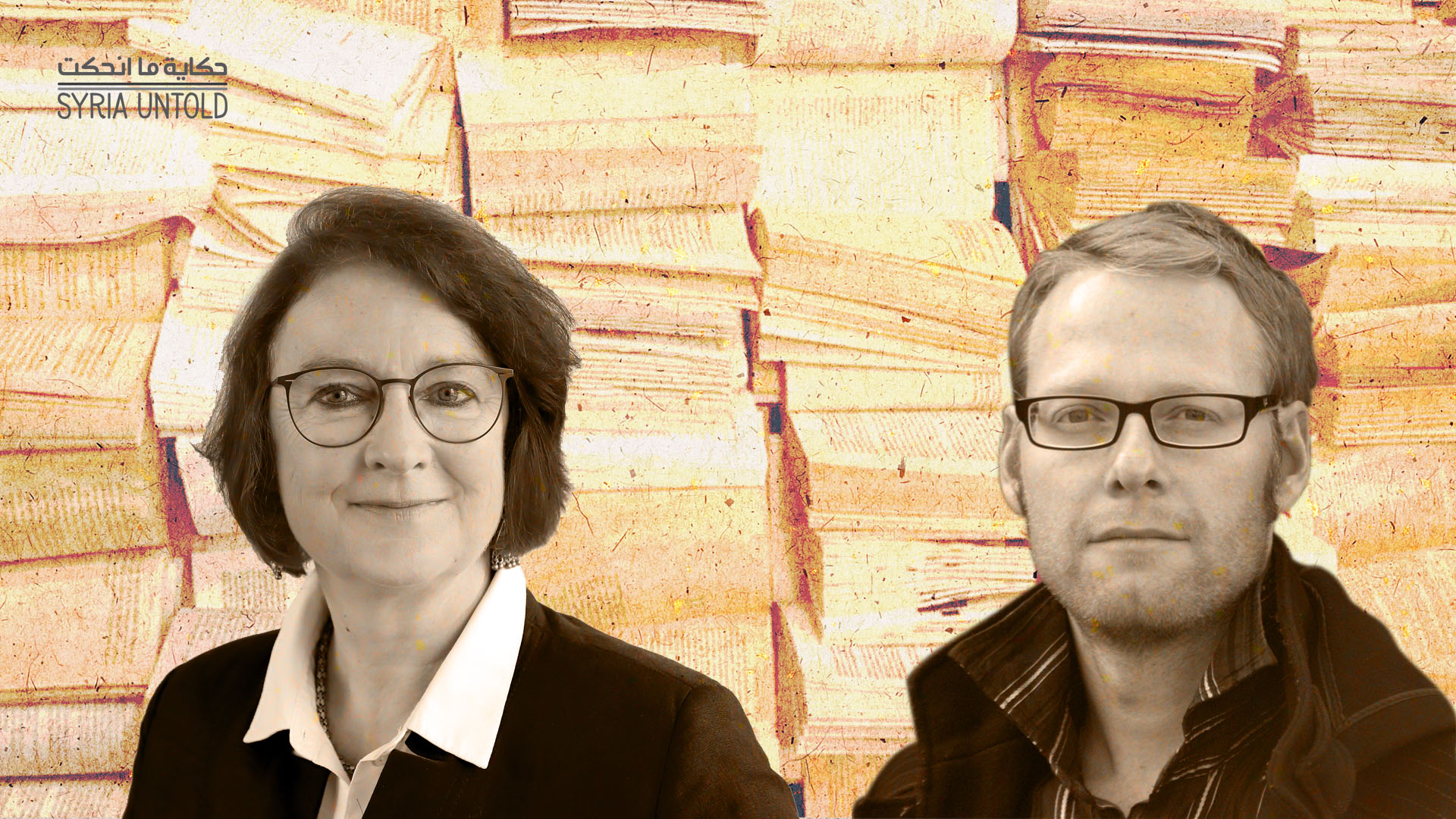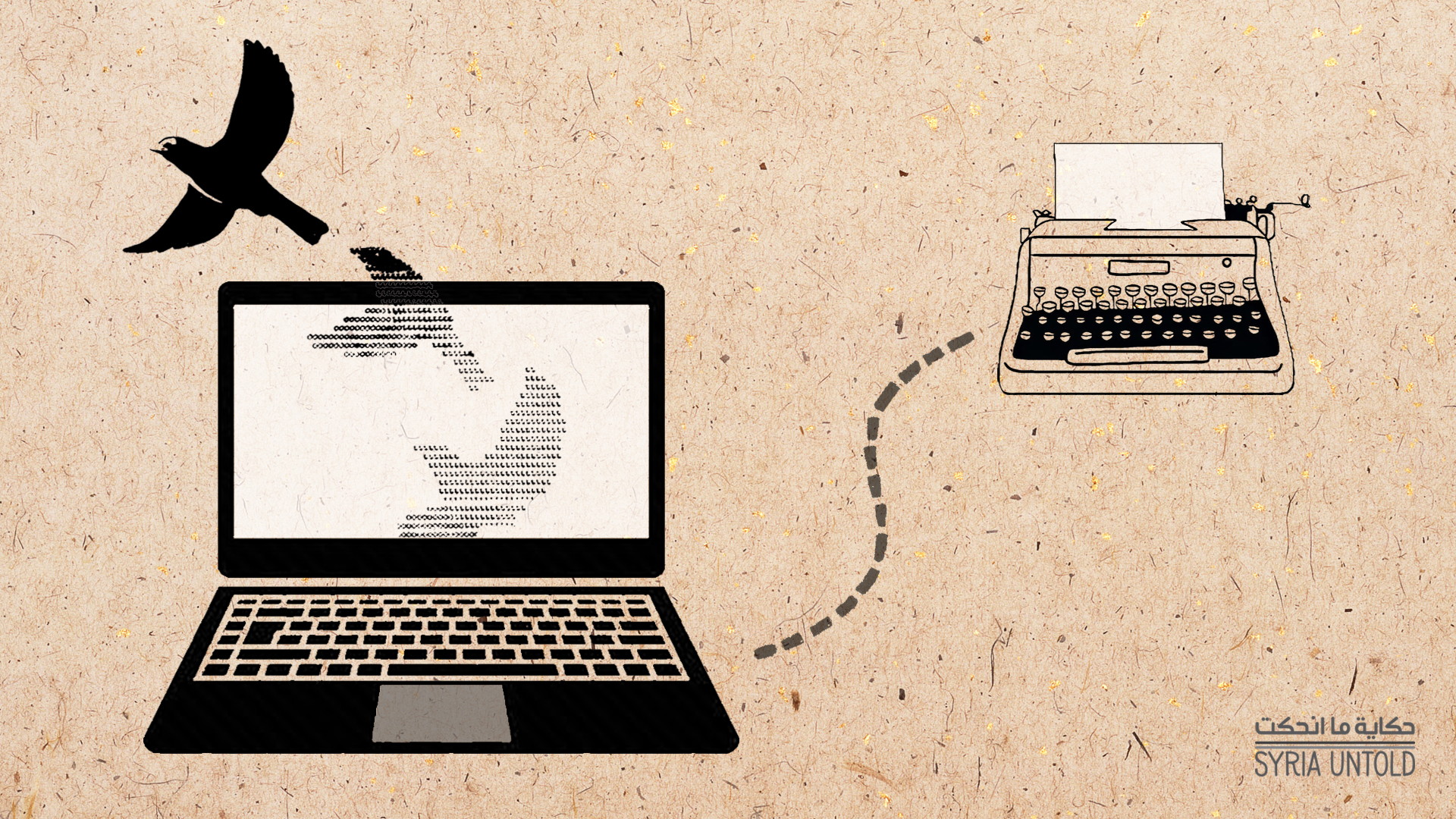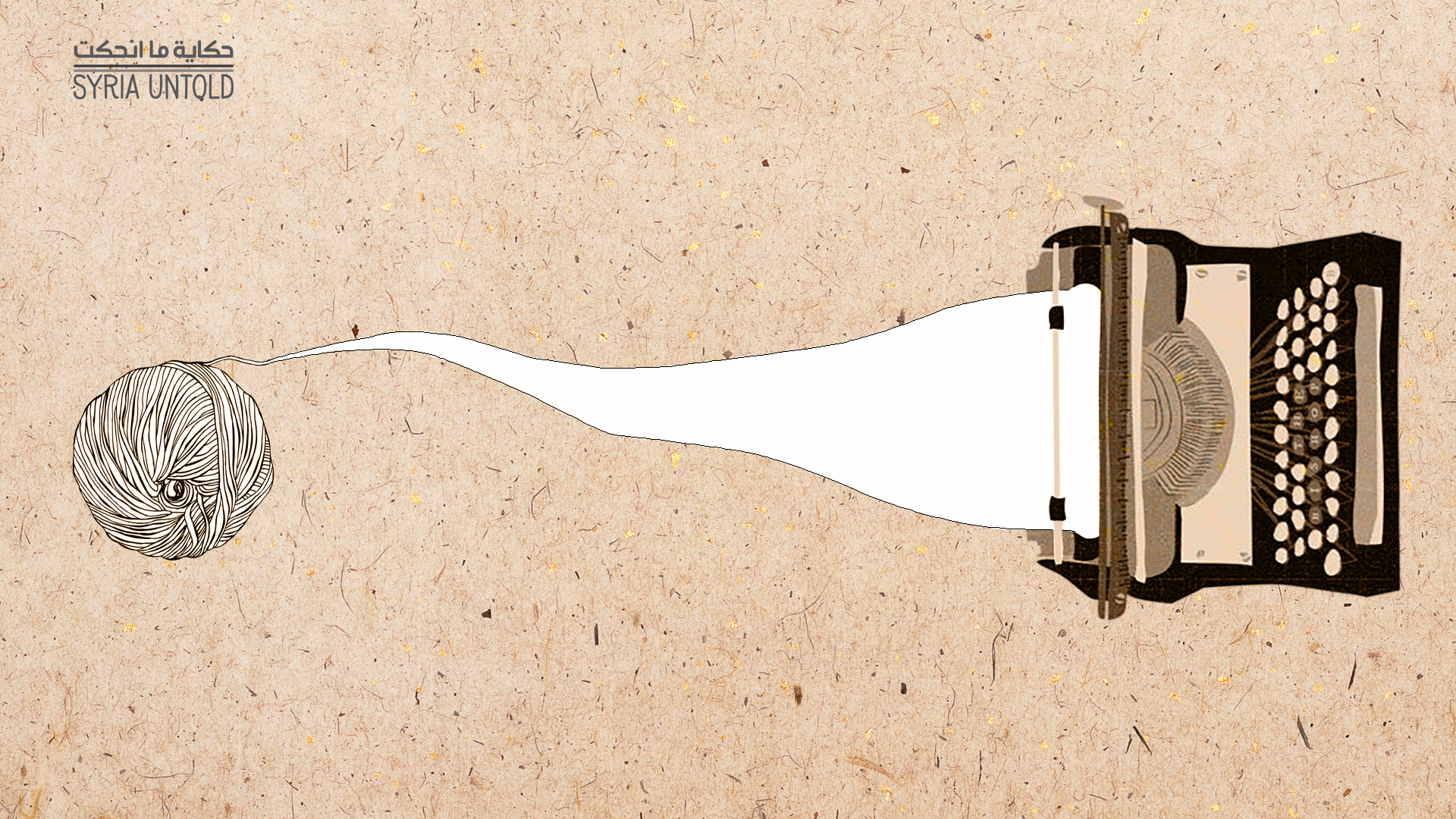Read this essay in Arabic here. This piece is part of a limited series on shifting narratives in Syrian literature, guest edited by novelist Rosa Yassin Hassan.
With the onset of the new millennium, the Syrian narrative boom became obvious, bidding farewell to the era of poets. The time for prose was now! This boom was not the result of a buildup of local narratives. It rather seemed to be a long repressed desire. For some, it looked like a fashion statement flirting with the trends abroad and keeping abreast of the needs of both local and neighboring markets, perhaps in the hope of snatching one of the prizes awarded to novels proliferating in the Arab world.
Although we cannot categorically refute the fashion hypothesis, its persistence for two decades is indicative enough of its fulfillment of genuine desires, in what resembles a general phenomenon where fashion is just a diversion rather than the essence.
Accordingly, we can talk about short waves of preoccupation with certain topics or styles considered to be in vogue. The context encompassing these waves is an event—a Syrian event that was long overdue when compared, for example, with a rich Egyptian history of narration.
Talking about a phenomenon does not entail value judgments in itself, as value judgments focus on individual actions, while the phenomenon itself accommodates differences in assessment that might be subject to temporary or transient considerations. A closer look sheds light on voices that emerged in the 1990s, heralding what would become a phenomenon in the following two decades. These voices particularly disposed of compulsory metaphors, and with them, of compulsory engagement with times now old or vague.
In our conversation about a lust for narration, a lust for speech, a lust for talking and a lust for owning the novel, we deliberately use the term “lust” with all its sensual connotations. It is not a metaphorical usage, at least in the Syrian context.
What did exile change in our narratives?
26 January 2021
Signs of modernism in the Syrian novel
19 January 2021
Lust carries a yearning for pleasure, and in our reality, pleasure is often a taboo. It has been coupled with committing forbidden acts, and with a turnout portending decades of deprivation. They are the decades under the Assad and Baath rule—decades marked by tyranny of the ruling regime’s narrative, a longing to speak and a muffled freedom of expression.
The Syrian narrative boom was not examined in connection with reality, and rarely was it considered a phenomenon related to aesthetic and narrative techniques. Generally, there weren’t any critical studies, or any influential ones at least, during that same period. Rather, there was media coverage, most of which limited its scope to the publication of books.
The tyranny of the ruling regime’s narrative is not just a marginal detail in this context. It is not a matter of forcible politicization to say that the boom of novels was a deep and touching attempt to own the personal narrative and snatch it from a hegemony that had lasted for decades. The intended novel is not necessarily political, but rather a desire to grasp the right to a personal narrative that is not aligned with the ruling or dominant one. It is also a diversion from the metaphorical, which was stripped of its artistic function and given a self-censorship function. It is the right to depravity that must be equally afforded, just as the right to voluntary metaphors or double entendre.
Far from any rivalry over the value between both literary genres, it was easier for poetry to continue, even thrive at times, under certain conditions that impeded narration and fiction. Poetry initially exists in the sphere of metaphors and double entendre, and it is the voice of the individual rather than their story.
In fact, it is important to distinguish clearly between the individual and their story. According to common sense, poetry is associated with feelings more than it constitutes a platform to express general convictions. Its concern lies more in language than its preoccupation with other elements. Poetry has been largely defined as an expression of the self about the self, while novels have expressed the self but through others and through the public sphere. That self might be concealed behind the narrative or narrator, or it might be present but far from metaphors and double entendre. As a matter of fact, some narrative experiences did not hide their inclination to expose the shocking and obscene self in retaliation against eras of repression.
Speaking about eras of repression transports us to the challenges that will be faced by new narrative endeavors. Paradoxically, modern writings have to face a pile of both new and old issues, some of which are related to the general reality while others are related to the development of the global art of narration. New novels will surely not reinvent the wheel, metaphorically speaking. But as easy as it may be to flow alongside new global narration trends, which often reach us through translation, it is not as easy to present special and different proposals. The “new Syrian narrative” is a loose expression that has emerged and encompassed what is temporally new but artistically part of the traditional narratives, in addition to new, albeit lesser, attempts at artistic experimentation. The expression keeps abreast of a general phenomenon, which has artistic variations and nuances. The common denominator, however, is the attempt to catch up on the past and own the lost narrative.
In our conversation about a lust for narration, a lust for speech, a lust for talking and a lust for owning the novel, we deliberately use the term “lust” with all its sensual connotations. It is not a metaphorical usage, at least in the Syrian context.
With the outbreak of the revolution, the Syrian narrative faced a new challenge that was the first of its kind, before other unexpected and deep-seated challenges unfolded. The first and main challenge was to keep up with the revolution in a narrative sense. Whether we were advocates of narrating the current event or of pausing to leave a temporal space for contemplation, the nature of the challenge or, better yet, the nature of the competition between the narrative and the revolution, does not change much.
In search of the best picture in the world
22 January 2021
Questions about growing change in Syrian narratives
12 January 2021
One of the main challenges of the revolution was not the ability to express it with fidelity, in the political sense of transparency, as the importance of the moral aspect lay elsewhere. In fact, the major challenge consisted of expressing art through art and the revolution through the narrative, considering the revolution is an art per se, and the narrative as another art that sometimes might intersect with the art of the revolution and sometimes diverge from it.
To a large extent, the revolution stores the lust for talking and owning the personal narrative and voice within its core democratic demands. However, this is not its main similarity and competition with the narrative. When we discuss art, we often overlook its intrinsic intensity, which is a notion related to the artistic moment rather than intensity of thoughts. In that sense, the revolution is an artistic moment compared to the traditional moment preceding or following it. It is that intensity that we did not experience as such, except in our dreams perhaps—yes, in our dreams—as intensity is a characteristic of the revolution and dreams, and supposedly of narratives.
For the sake of the revolution, not the narrative
The revolution facilitated the unprecedented spread of the Syrian narrative in several languages. This success has thus far been to the advantage of the revolution more than the narrative. The motive which sparked the world’s interest was the political event, rather than that artistic peculiarity, and it was responsible for increasing the readership of the Syrian novel. This is not to undermine the standard of the published works or deliberate between their different artistic levels. In other words, the revolution, which presented an artistic challenge, offered key opportunities and encouragement at the marketing level. However, what sells might fade away when its causes disappear. Artistic challenge lives on in all its origins and ramifications, which were not accounted for previously.
We do not know, for instance, how a Syrian narrative text written in Germany and influenced by its new setting will be received by a Syrian reader in Istanbul, Beirut, Damascus, Aleppo or Paris. We suppose that the text will not be received in the same way as it was before, when everybody lived in one, common place, shared a similar daily life and disagreed on the same issues.
As part of these ramifications, we can allow ourselves to ask a question that might not be premature: Will our talk about the Syrian narrative remain as significant as it is now? What’s more, at the time of writing these lines, is the narrative written by Syrians a Syrian one per se, according to the aforementioned sense of the word, and the traditional meaning related to any geographic division, like the Egyptian or Turkish narrative, for example?
To answer these questions, let us suppose that writers who are in exile and who might not have the opportunity to return will not be isolated from the cultures of their various exiles. The countries of exile will, in fact, have a clear or concealed effect on their next narratives. The diversity of exiles will result in the creation of narratives that have lost an important aspect of shared heritage, which we discussed above in the context of emergence of the Syrian narrative. With the forced displacement of one-third of Syrians abroad, Syrian readers will experience the same fate as the writers who will become vulnerable to the cultures of their different countries of exile and might even identify with them, thus impacting how readers receive their work.
We do not know, for instance, how a Syrian narrative text written in Germany and influenced by its new setting will be received by a Syrian reader in Istanbul, Beirut, Damascus, Aleppo or Paris. We suppose that the text will not be received in the same way as it was before, when everybody lived in one, common place, shared a similar daily life and disagreed on the same issues that constituted a public interest or the concern of a certain category in the geographical space constituting the purpose of writing these lines, hence Syria.
For my part, I believe the most important thing is to hold on to the right to a personal narrative and to the lust for talking, not because it was forbidden, but out of love for it after tasting its pleasure. The Syrian narrative is open to several possibilities, including the dissipation of expression and the emptying of its meaning. If this possibility comes true, the Syrian narrative’s journey will be a short one. Leaning towards pleasure might not be negative at all, as pleasure has always been personal, just like the desires seeking it.








